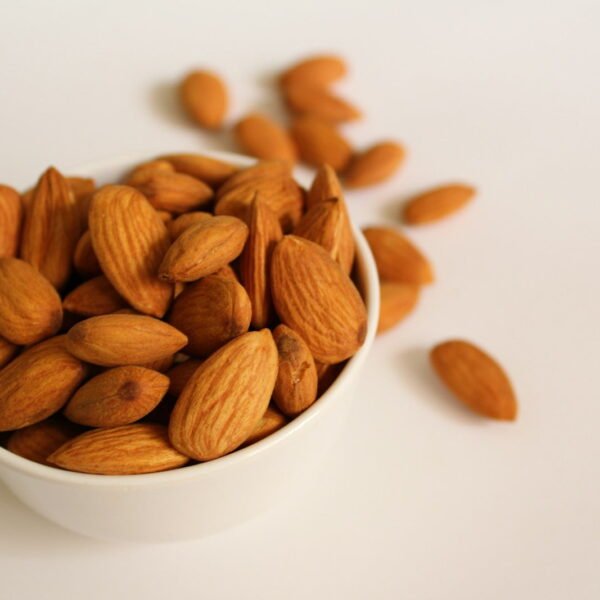Import
Are you wondering? What do almonds help with?You are not alone.
In an era where healthy eating is gaining ground every day, almonds have become protagonists in the dietary choices of millions of people worldwide.
Not only are they tasty and versatile, but they also contain a number of benefits that enhance the health of the body and mind.
The question What do almonds help with? arises often — and not unfairly.
This article aims to provide clear, practical and evidence-based answers, presenting the nutritional value and most important benefits of consuming almonds.
Nutritional value of almonds
Plant-based protein
Almonds are one of the best sources vegetable protein.
For those following a vegetarian or vegan diet, consuming almonds offers significant support for daily protein intake.
This indirectly answers the question, as protein is a foundation for muscle health, rebuilding, and energy.
Healthy fats (monounsaturated)
Almonds are rich in monounsaturated fatty acids, which contribute to heart health and cholesterol regulation.
Unlike saturated fats, these boost “good” HDL cholesterol and help reduce LDL.
Vitamin E, magnesium, calcium, fiber
Almonds contain vitamin E — a powerful antioxidant that protects cells from damage.
In addition, it is an excellent source magnesium, calcium and vegetable fiber.
This nutritional profile explains What do almonds help with? at so many different levels of health.
Antioxidants
The antioxidants contained mainly in the skin of almonds fight oxidative stress, protecting the body from premature aging and inflammation.
Where almonds help – Health benefits
2.1 Heart health
Cholesterol regulation (LDL/HDL)
Regular consumption of almonds contributes to reducing LDL (bad) cholesterol and increasing HDL (good) cholesterol.
This makes it an ideal food for preventing heart disease.
Cardioprotective action
Almonds offer cardioprotection, thanks to good fats, potassium and antioxidants.
It is no coincidence that many cardiology protocols incorporate them into diets.
2.2 Boosting memory and brain function
Role of vitamin E
THE vitamin E enhances brain function and oxygenation of nerve cells.
A handful of almonds can act as a daily "tonic" for the mind.
Relationship with prevention of cognitive decline
Research has linked almond consumption to better memory and reducing the likelihood of developing Alzheimer's at older ages.
If you are wondering What do almonds help with?, mental function is definitely one of the top answers.
2.3 Blood sugar regulation
Low glycemic index
Almonds have low glycemic index, meaning they do not cause sudden increases in blood sugar.
This is especially useful for people with diabetes or predisposition.
Energy stabilization
As they do not cause energy “bursts” and sudden drops, almonds help in stable energy efficiency during the day.
2.4 Weight loss support
Feeling of satiety
Almonds are one of the few snacks that offer saturation without filling the body with "empty" calories.
This helps control hunger between meals.
Healthy snack without unnecessary calories
When consumed in moderation, almonds can be ally in weight loss diets.
Rich in protein and good fats, they fill you up without weighing you down.
2.5 Skin and anti-aging
Vitamin E and antioxidant protection
Vitamin E acts against premature aging, enhances skin elasticity and protects against the damage of time.
Help in cases of dry skin
Almonds offer hydration from within, enhancing the quality of the skin, especially during periods of intense dryness.
2.6 Bone health
Source of calcium and magnesium
Almonds are rich in calcium and magnesium, ingredients necessary for the bone density.
It is an excellent choice for those who do not consume dairy products.
2.7 Immune boosting
Zinc, vitamins and phytochemicals
The presence zinc, B vitamins and phytochemicals makes almonds a real "weapon" for strengthening the body's defenses.
How to include almonds in your diet
Raw, cooked, uncooked with skin
Prefer raw almonds with the skin, as many antioxidants are hidden there.
Baked ones taste great, but heat slightly reduces the benefits.
Snack, in salads, smoothies, almond butter
- As snack between meals
- Sprinkled on salads or yoghurt
- In smoothies with banana and cocoa
- As almond butter on toast or pancakes
Almond recipes (e.g. bars, almond yogurt, almond milk)
Try:
- Energy bars with oats and almonds
- Yogurt with honey and almonds
- Homemade almond milk without additions
Consumption becomes a pleasure and a benefit at the same time.
What to watch out for
Quantity (recommended daily consumption ~23 almonds)
THE recommended amount That's about 23 almonds a day, which is a small handful.
More is not necessarily better, especially if you are on a weight control program.
Caution for people with allergies
Although rare, there are people with allergy to nuts.
In such cases, complete avoidance is required.
Choose natural products without additives
Avoid salted, caramelized or chocolate coated.
Prefer natural almonds without additives for maximum benefit.
Conclusion
Are you still wondering? What do almonds help with?The answer is simple: almost everywhere.
- From the heart to the brain.
- From the bones to the skin.
Almonds aren't just a snack. They're complete superfood.
And they can be incorporated into your diet in countless ways.
It is worth consuming them in moderation, but systematically. For energy, balance and strengthening your body — almonds are a true ally.
Related Products
-
Almonds raw crumb
0.80€ – 8.00€Price range: 0.80€ through 8.00€



